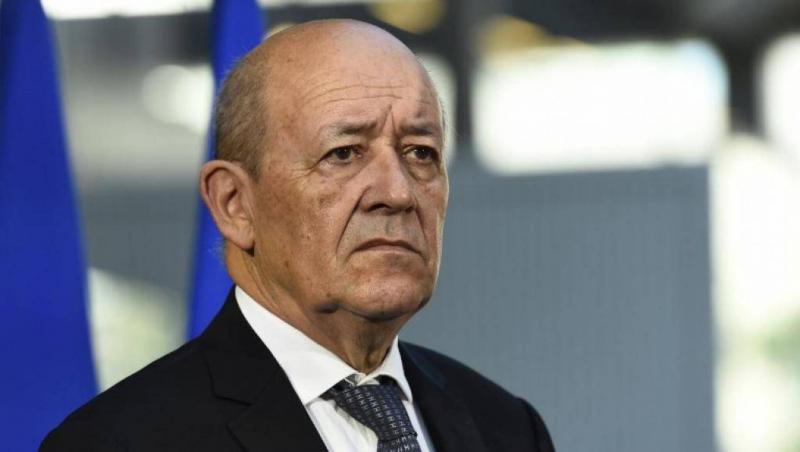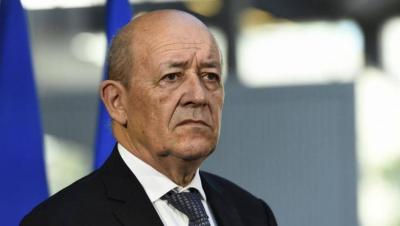French presidential envoy Jean-Yves Le Drian urged Lebanese officials to find a "third option" to resolve the presidential crisis. In a statement, he noted that "the five countries involved in Lebanon's file question the usefulness of continuing their financial support." In an interview with the newspaper "L'Orient-Le Jour," he remarked that "Lebanon's vital forecasts are at risk, but the political players, who bear the responsibility, remain in denial. There has been no president for a year, no prime minister for eighteen months, the parliament does not convene, and the former central bank governor is facing international prosecution. During this time, the economic situation is deteriorating, and some live under the illusion that the diaspora or the future gas resources, about which little is known, will somehow fill the financial gap. Despair is present while we continue to dwell on perpetual tactical considerations. This is truly unbearable."
Le Drian emphasized that "the mission assigned to me by French President Emmanuel Macron is a mediation task aimed at ensuring that the actors reach a solution, but if they do not want to find a solution, I cannot impose it upon them." He confirmed that "there is no disagreement, not even a slight difference, among the five countries. Those who suggest otherwise are promoting illusions intended to maintain confusion for tactical reasons. The five are in constant communication. Lebanese officials must understand that the last meeting of the quintet was marked by anger at their denial and inability to overcome their contradictions. The five are asking how long assistance to Lebanon will continue."
When asked about the internal powers betting on a regional international agreement that reflects on the Lebanese interior, Le Drian responded: "This is what is called irresponsibility and evasion. In the view of the five, the Lebanese must take responsibility. If they fail to do so, it will be their fault, and they must bear the responsibility." He added, "I believe that the confrontation between the two blocs from the June 14 election session, one supporting Jihad Azour and the other supporting Sleiman Frangieh, will not provide any solution. Remaining in this conflict leads to failure. Therefore, Lebanese actors must seek a third path. Everyone knows that this is how things need to end, and we must finish as quickly as possible because emergencies do not wait."
In response to a question about his recent visit to Beirut and whether he sensed an opportunity to explore this third option, he replied: "When I say these things, no one contradicts me, and that is progress. However, there is still a long way to go before reaching a conclusion, so I intend to return at least once more." When asked about the Saudi position, he said: "I noted with interest that Saudi Arabia is returning to the game, seeing that the Lebanese vacuum can punish the entire region from a security and economic standpoint, and therefore we must mobilize to break the deadlock, and they are now announcing that."
Regarding the future of his mission, he stated: "My role as a facilitator is to inform each representative what others believe, as they do not communicate with each other. Some have given me their comments in writing, while others verbally. I will invite everyone to attend meetings, identify points of convergence, and then a series of consultations will be needed. I no longer use the term dialogue because I see it as toxic in Lebanon, given the historically divisive charge this term carries. After the consultations, I hope that Speaker Nabih Berri will call for consecutive open parliamentary sessions, as he publicly pledged to do, all of this should happen in the coming weeks."
On the lack of agreement on a third candidate and the inability to reach consensus, Le Drian pointed out that "Lebanese officials will have to bear the responsibility for that. I hope they realize they must find a way out; otherwise, they will be abandoned by the international community. Nobody will want to see them anymore, and it will not be useful to seek support from here or there. As a mediator, I believe we can find a solution through this third path. The names will then be circulated, and the decision will rest with the Lebanese. The consultation period can be used to achieve that. Officials must face the consequences of not fulfilling their duties, and I believe they will understand what that means."
Regarding his interpretation of France's long-standing support for the equation of Sleiman Frangieh-Nawaf Salam, he observed that "neither of the current applicants seems likely to solve the problem. I say this as a personal envoy of the President of the Republic." When asked about accusations that Paris serves the interests of Hezbollah in Lebanon and the region, Le Drian questioned, "What are these interests? France wants Lebanon to rise and start implementing the necessary reforms for its survival. France's sole goal is for Lebanon to maintain its territorial integrity and regain the drive and strength to carry out fundamental reforms."
When asked about France's insistence on dialogue and compromise, and whether he considers it a mistake for Paris with Hezbollah, akin to the mistake made with Moscow, Le Drian highlighted that "the balance of power has led to the disappearance of the Lebanese state. We must move beyond this and find a solution that allows Lebanese forces to coexist with each other, and among the forces representing these sects, there is also Hezbollah."
Le Drian expressed hope that a president might be reached in the upcoming period, believing this is possible while preserving everyone's dignity, as there is awareness that the fundamentals are now at stake, and the issue is no longer about electing a president but the very existence of Lebanon. He warned that the vital signs of the Lebanese state show that it is in serious danger, stating: "Neither can win, and neither option can succeed."




